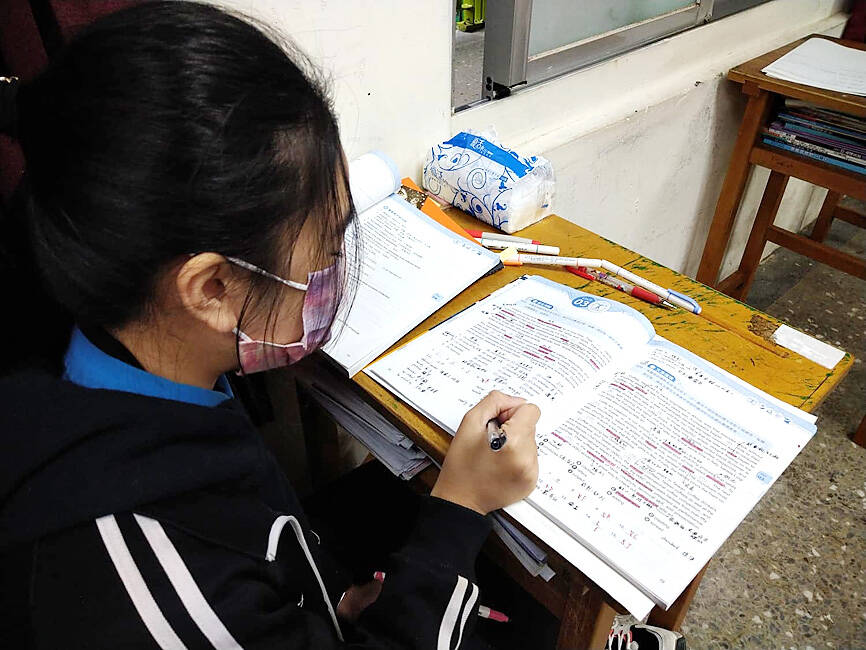School history textbooks should specify that UN Resolution 2758 does not mention Taiwan, and teach students that China is misinterpreting its text to exclude the nation from international affairs, the National Academy for Educational Research said yesterday.
The academy issued the statement — one of two at its trilateral curriculum meeting — regarding research, and textbook reviewers and publishers for the “Modern Taiwan and the Rise of Modern Nations” section of high-school history textbooks.
The other resolution was that junior-high history textbooks should not only include sections on the Cairo Declaration, but also cover the Sino-Japanese Peace Treaty — a treaty between the Republic of China (ROC) and Japan — and the San Francisco Peace Treaty.

Photo courtesy of Keelung Senior High School
Regarding UN Resolution 2758, the academy said that textbooks should include the original text in English and Mandarin, as well as make a clear statement that it does not mention the ROC or Taiwan.
National Academy for Educational Research president Lin Chung-yi (林從一) said that education textbooks should not be static, but should be revised based on education needs and other factors.
Any doubts and questions would be thoroughly discussed by a panel of experts at the academy, which is responsible for modifying the nation’s curricula, Lin said.
If necessary, it would consult experts or hold trilateral meetings to ensure that other opinions are incorporated, he said.
Academy presidents must sign all textbook changes and the institute is obligated to ensure that changes do not affect the quality of the materials, he said.
Separately, K-12 Education Administration Deputy Director-General Tai Shu-fen (戴淑芬) said that the Ministry of Education is collaborating with schools to provide supplemental teaching materials, such as podcasts and videos, that would help students learn about China.
The material would be distributed to teachers during a summer workshop, which social science teachers nationwide are asked to attend, Tai said.
President William Lai (賴清德) among his national security policies issued on March 13 asked the ministry to look into policies on teaching schoolchildren how to spot Beijing’s propaganda.
Minister of Education Cheng Ying-yao (鄭英耀) on Monday said that the ministry would develop materials on national identification and how to identify materials containing Chinese propaganda.
Cheng’s statement was in response to Democratic Progressive Party Legislator Lin Yi-chin’s (林宜瑾) comment that parents in her district complained that elementary-school teachers openly said in class that “we are Chinese” and that such incidents might reflect some teachers’ attempt to impose their national identification on students.

Taiwan is projected to lose a working-age population of about 6.67 million people in two waves of retirement in the coming years, as the nation confronts accelerating demographic decline and a shortage of younger workers to take their place, the Ministry of the Interior said. Taiwan experienced its largest baby boom between 1958 and 1966, when the population grew by 3.78 million, followed by a second surge of 2.89 million between 1976 and 1982, ministry data showed. In 2023, the first of those baby boom generations — those born in the late 1950s and early 1960s — began to enter retirement, triggering

One of two tropical depressions that formed off Taiwan yesterday morning could turn into a moderate typhoon by the weekend, the Central Weather Administration (CWA) said yesterday. Tropical Depression No. 21 formed at 8am about 1,850km off the southeast coast, CWA forecaster Lee Meng-hsuan (李孟軒) said. The weather system is expected to move northwest as it builds momentum, possibly intensifying this weekend into a typhoon, which would be called Mitag, Lee said. The radius of the storm is expected to reach almost 200km, she said. It is forecast to approach the southeast of Taiwan on Monday next week and pass through the Bashi Channel

NO CHANGE: The TRA makes clear that the US does not consider the status of Taiwan to have been determined by WWII-era documents, a former AIT deputy director said The American Institute in Taiwan’s (AIT) comments that World War-II era documents do not determine Taiwan’s political status accurately conveyed the US’ stance, the US Department of State said. An AIT spokesperson on Saturday said that a Chinese official mischaracterized World War II-era documents as stating that Taiwan was ceded to the China. The remarks from the US’ de facto embassy in Taiwan drew criticism from the Ma Ying-jeou Foundation, whose director said the comments put Taiwan in danger. The Chinese-language United Daily News yesterday reported that a US State Department spokesperson confirmed the AIT’s position. They added that the US would continue to

The number of Chinese spouses applying for dependent residency as well as long-term residency in Taiwan has decreased, the Mainland Affairs Council said yesterday, adding that the reduction of Chinese spouses staying or living in Taiwan is only one facet reflecting the general decrease in the number of people willing to get married in Taiwan. The number of Chinese spouses applying for dependent residency last year was 7,123, down by 2,931, or 29.15 percent, from the previous year. The same census showed that the number of Chinese spouses applying for long-term residency and receiving approval last year stood at 2,973, down 1,520,